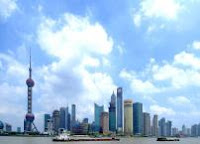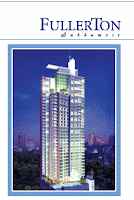
Tuesday, February 5, 2008
KBank finance condo on Sukhumvit

Shanghai RE to slow in ’08
 Investment in Shanghai´s real estate market is expected to grow less rapidly and become more vulnerable to policy uncertainties in 2008, according to several large real estate service providers.
Investment in Shanghai´s real estate market is expected to grow less rapidly and become more vulnerable to policy uncertainties in 2008, according to several large real estate service providers.Real estate investment saw a slowdown in the fourth quarter last year, with only one notable sales transaction completed in the city, after the government implemented the land appreciation tax and imposed additional restrictions on foreign investment in the sector, according to Jones Lang LaSalle.
"Increasing monetary control and tightening policies are bringing more uncertainties, particularly to the investment market," said Lee Hingyin, director of Research & Consultancy at Colliers International (Shanghai). "The investment market may feel the pinch, and it is likely that foreign investors will be more vulnerable to these policy changes this year," said Lee, adding that he expects more severe measures, which will significantly cool down the investment market.
James MacDonald, senior manager of Research at Savills China, however, said: "In the institutional investment market, it´s not necessary that new policies will be introduced and will affect the market in a big way. Instead, it is the more stringent implementation of previous regulations that has to be
watched."
"The government´s tighter monetary policy this year is expected to have a negative impact on the real estate investment market, which is highly dependent on bank loans," said Chen Sheng, director of the China Index Academy, which tracks property prices.
Wang Qing, an economist at Morgan Stanley Asia Ltd, said in a report that sectors with a high debt-asset ratio, such as real estate, tend to experience larger declines in fixed-asset investment growth after credit tightening. The debt-asset ratio of the real estate sector is over 70 per cent.
Liu Shiyu, deputy governor of the People´s Bank of China, the country´s central bank, said the government will strengthen commercial real estate management and adjust the real estate credit structure to prevent risk.
Sunday, February 3, 2008
Cambodian goes sky-high

BRONWYN SLOAN
Luxury condo market (Bangkok)
 Major Development Plc Plc (MJD) remains confident in the growth of the luxury condominium market in next three years despite global sluggishness triggered by the declining US economy, says chief executive officer Suriyon Poolvoralaks.
Major Development Plc Plc (MJD) remains confident in the growth of the luxury condominium market in next three years despite global sluggishness triggered by the declining US economy, says chief executive officer Suriyon Poolvoralaks.Chiang Mai property boom
 After slowing down for a year, the Chiang Mai property market is expected to revive this year under the new government led by the People Power Party, according to Jarin Pongyen, senior vice-president of the listed developper Quality Houses Plc (QH).
After slowing down for a year, the Chiang Mai property market is expected to revive this year under the new government led by the People Power Party, according to Jarin Pongyen, senior vice-president of the listed developper Quality Houses Plc (QH). ''People in Chiang Mai are very sensitive to the political situation. They spent less and saved more since the political situation was uncertain (last year) despite having high purchasing power,'' he said yesterday. ''They are ready to spend again if they are more confident in the political situation which is clearer now.''
Mr Jarin said total savings in Chiang Mai rose from 94 billion baht in 2005 to 103 billion last year but a decline in spending was reflected in lower value-added tax collections and car and motorcycle registrations.
The number of transactions registered at the Chiang Mai Land Office declined from 15,000 in 2005 to 10,000 in 2006 and 9,800 last year. Revenue generated from property transactions dropped from 1.3 billion baht in 2005 to 1.2 billion in 2006 and 900 million baht last year.
The sharpest decline was in housing units priced below two million baht, representing 80% of the total market.
''People in Chiang Mai delayed their decisions. Last year small and medium-scale developers faced lower sales below 50% [of units available] compared with the normal period when they generated sales of up to 70-80%,'' said Mr Jarin, a Chiang Mai-born executive who oversees QH's business in the North.
However, housing priced above two million baht a unit, with about 20 projects on sale, remained strong. Total sales in this segment grew from 1.8 billion baht in 2006 to 1.9 billion last year.
In Chiang Mai, he said, most residential development is in the eastern part of the province in the San Sai, San Kamphaeng and Doi Saket areas.
QH plans to develop high-priced housing units under its Laddarom brand next year on a 60-rai site on the Middle Ring Road, after its Laddarom Elegance is expected to close sales by the end of the year. It also has another two plots of land _ 80 rai on the Outer Ring Road and 90 rai on the Middle Ring Road _ for future development.
QH last year recorded sales of 600 million baht, double its 2006 total, from the existing three projects including 300 million baht from Vararom Kaewnawarat and Vararom Charoen Muang and 300 million from Laddarom Elegance.
Mr Jarin said QH expected total sales of 700 million baht from housing in Chiang Mai this year. Currently, QH and its parent, Land & Houses Plc, have a combined 60% share of Chiang Mai housing priced above two million baht.
QH shares closed yesterday on the SET at 2.34 baht, up 20 satang.KANANA KATHARANGSIPORN